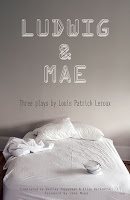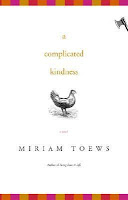I've sort of been powering through over the last couple weeks and have almost completed a rough draft of the novel... which just seems sort of surreal, really. Sort of, "I can't believe I'm getting the opportunity to do this."
So. The last part of the book is a bit surreal, also, about this adolescent girl watching her parents' marriage crumble and not really reacting to it in any way that indicates emotional attachment. It's almost like she's watching this happen to someone else's family, except for that she calls them 'mother' and 'father.' Which, by the way, is maybe a bit weird. Does anyone call their parents mother and father? In the French text, it's 'ma mère' and 'mon père,' which are words that can be construed as either formal or informal as the case may be, where as the words 'mother' and 'father' bring to mind a repressive British upbringing involving parents who don't spare the rod and a father who demands to be addressed as 'Sir.' So, should she be calling them 'my mom' and 'my dad' instead? It's a tough call, because there is an emotional distance between them... maybe that's a question that I'd like to ask the author.
Anyways. Two questions about
alcohol.
1. At one point, there is a party going on and the host has made
alcool d'épluchures de fruits, or fruit-peel alcohol. The recipe came from a friend, who learned it while he was doing hard time... So is this best left as is (fruit-peel alcohol)? Or can I call it something more poetic, like fruit-peel brandy, or fruit-peel liqueur?
2. Liam, the protagonist's mentor, has a liquor cabinet and, upon the arrival of a friend, breaks out the
alcool aux petites oranges amères. This, literally, is "small bitter orange alcohol." I'd like to just call it "
orange bitters," but am not quite sure what a "bitter" is in terms on alcohol. Also, it is possible that this is referring to a
Curaçao, which is a type of liqueur made from bitter oranges. I think that this is more likely... anyone want to weigh in? What would you bring out a bottle of for a long night of philosophical discussion with a friend?
Also. In the novel, the protagonist and her family go to a Polynesian buffet called "Jardin Tiki" in Ste-Agathe. The cuisine is described as Chinese, all the cooks are Chinese, and it seems like a Great Buffet of China sort of place and it occurred to me that... hey. China isn't in Polynesia.
Ther are a lot of places that are in Polynesia, but China isn't one of them. So I was looking around the Schminternet at all things Tiki, and lo and behold, there is actually a Jardin Tiki in Montreal, close to the Olympic Stadium. The reviews say that the food is predominantly Chinese, not Hawaiian or Samoan or Cook-Island-ese. So maybe Vincelette was inspired by a visit to the Tiki? To any and all who may be tempted, the reviews add that the food is nothing to write home about - pretty atrocious really - but the key is to go there and drink lots and lots.














































